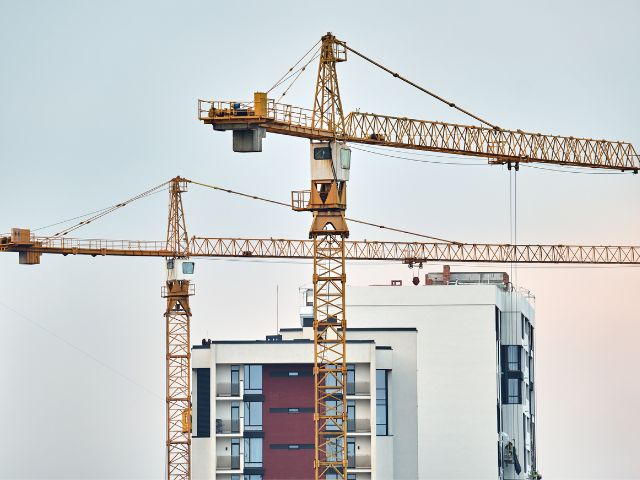Updated: Feb 15, 2024, 5:23 PM | By StateNewsJournal

Construction crews use various industrial machines to complete projects. Among these mechanical marvels, construction cranes command the skies. Read on about the different types of construction cranes and their applications.
Tower cranes are common among urban construction sites thanks to their height and lifting capacity. These cranes are fixed to the ground or attached to the side of structures, making them ideal for skyscraper projects or other large buildings.
The main components of a tower crane include the base, tower or mast, and the slewing unit, which allows the crane to rotate. Tower cranes can lift several tons of weight, with the load capacity decreasing as the load moves away from the center of the crane.
Mobile cranes can transport heavy materials across job sites and public roads without the need for transport machinery.
These cranes typically feature a telescopic boom mounted on a mobile platform, such as a truck or a caterpillar track. This unique design allows for a wide range of movement along vertical and horizontal axes, offering an unmatched adaptability to diverse construction scenarios.
Rough-terrain cranes are ideal for operations that demand lifting capacity and maneuverability in uneven or off-road conditions. These cranes use a single engine to power the undercarriage and the crane itself.
Their standout feature is a stable base that can withstand harsh terrains. With their large rubber tires designed for off-road mobility, rough-terrain crane rentals are perfect for navigating construction sites in rugged environments.
Telescopic cranes are distinguished by their boom of nested tubes. A hydraulic mechanism extends or retracts these tubes to adjust the boom’s length. These cranes are exceptionally versatile thanks to their impressive capacity and reach in confined areas that enable efficient transport and storage. They are invaluable in crane relocation or limited space availability.
Crawler cranes provide exceptional stability and lifting capacity. The name comes from the crawler tracks, similar to those on bulldozers or tanks, which enable them to navigate challenging terrains with ease. Plus, the weight distribution across the large surface area minimizes the risk of sinking on soft ground.
The lattice boom structure offers a greater reach and lifting capacity than telescopic booms. They’re beneficial for building bridges, highways, wind farms, and high-rise buildings. Although assembly and disassembly may require time, the lifting power and versatility of crawler cranes make them invaluable on construction sites.
A well-rounded knowledge of the various cranes is paramount for any construction professional. When you understand the different types of construction cranes, you can efficiently move your project forward.
24World Media does not take any responsibility of the information you see on this page. The content this page contains is from independent third-party content provider. If you have any concerns regarding the content, please free to write us here: contact@24worldmedia.com


Industries Currently Relying on ....

5 Essential Tips on How To Hurri....

Mistakes To Avoid When You’re ....

The 5 Pieces of PPE Every Constr....

Lake Fishing: Tips and Tricks fo....

The Process Behind Custom Soleno....

Tips for Maintaining an Indoor P....

How To Know if Your Industrial F....